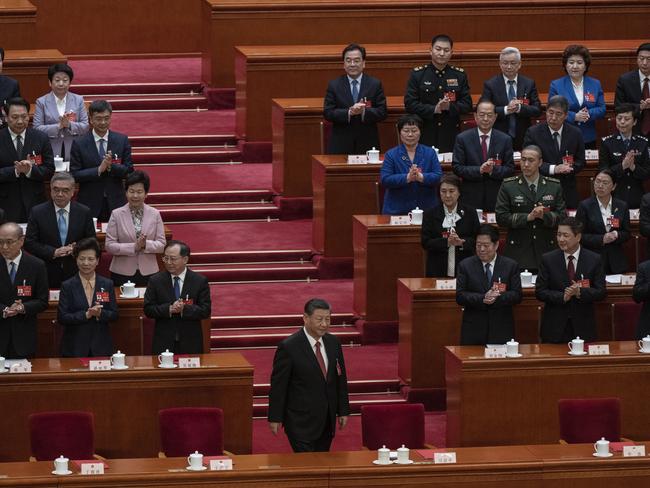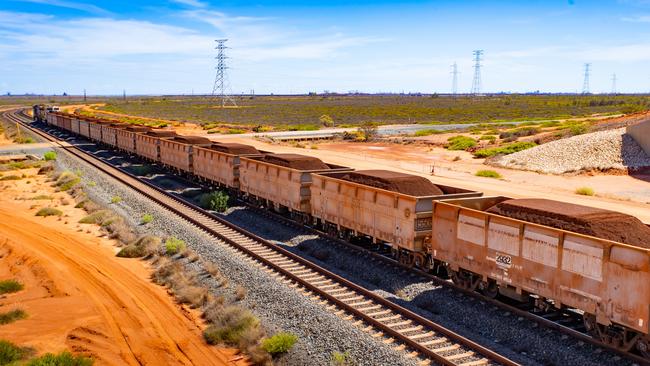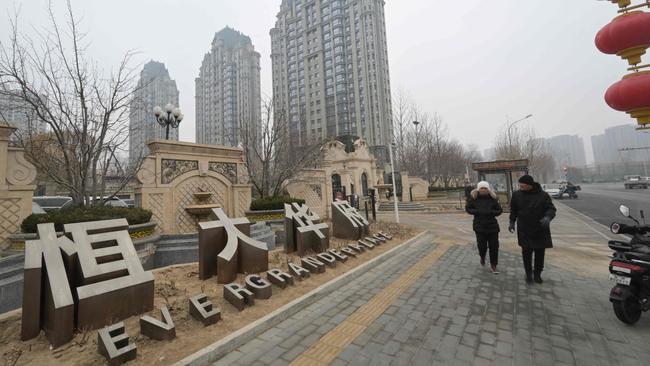Iron ore disaster after China’s drastic move
Australia’s future was riding on one decision from Beijing – and it’s not gone our way. The country’s cash cow may have just died.
Mining
Don't miss out on the headlines from Mining. Followed categories will be added to My News.
Iron ore prices have plunged another 7 per cent this week. And China’s refusal to bail out the developers behind that country’s burst property bubble means the worst is yet to come.
China’s National People’s Congress concluded on Monday night. Economists had been watching it closely in the hope that a massive government stimulus package would be announced to revive the country’s stagnating economy.
But China’s real estate tycoons won’t be getting a bailout.
Instead, China’s Communist Party seemed more interested in punishing the property magnates behind the $7.5 trillion market’s collapse.
“Those who commit acts that harm the interests of the masses will be resolutely investigated and punished in accordance with the law. They will be made to pay the due price,” Minister of Housing and Urban-Rural Development Ni Hong said at the weekend.

But China’s developers are drowning in debt.
That means tradies aren’t getting paid. Nor are the interest bills on loans.
That means no new massive building projects consuming steel.
The alloy is needed in bulk to provide structural strength.
Iron ore is steel’s main ingredient. Traces of other elements, such as carbon, manganese, and phosphorus, are added to tailor its properties. High-grade stainless steel – needed for things like warships and exposed structures – adds chromium, magnesium and nickel to the mix.
And while China is rapidly building up its navy and merchant fleet to become the largest in the world, it’s not consuming iron ore on the same scale as the property industry.
So Australia’s iron ore export cash bonanza – which has been credited for saving the federal budget over several terms of government – may soon be over.

March iron ore futures prices have come off early January highs by about 25 per cent. They fell 7 per cent in Singapore trading on Monday as the Chinese Communist Party’s lack of interest in stimulating the market became apparent.
“I see no reason why they should stabilise yet,” analyst David Llewellyn-Smith said. “If domestic steel demand is weak, cheaper prices will be needed to increase export volumes.”
Real estate fallout
Major Chinese real estate developers Evergrande and Country Garden have been defaulting on their debts. Plunging new home sales – which they rely on to pay for past construction – indicate no improvement is likely in the near future.
“For real estate companies that are seriously insolvent and have lost the ability to operate, those that must go bankrupt should go bankrupt, or be restructured, in accordance with the law and market principles,” Minister Ni told media at the weekend.
The Chinese property market’s extreme exposure to debt attracted global concern after the Great Financial Crisis (GFC) of 2012. Fears were raised that its collapse would have far-reaching impact across the global economy.
Beijing waited until 2020 to react. After all, its developers were contributing 30 per cent of the national Gross Domestic Product (GDP). Only then did It pass laws mandating liability-to-asset ratios and liquidity standards.

But most leading property developer balance books were far from those minimum levels. And they had been relying on endlessly increasing debt to produce growth.
The new standards caused developers to run out of money to finish building apartments already paid for by Chinese family investors. In retaliation, buyers refused to pay their mortgages.
Now, this year’s “Two Session” of China’s main parliamentary bodies telegraphed the Communist Party’s desire to double down on the industry. Instead of stimulus, talk focused on “a new development model”.
“We will scale up the building and supply of government-subsidised housing and improve the basic systems for commodity housing to meet people’s essential need for a home to live in and their different demands for better housing,” Premier Li Qiang’s said in his formal Government Work Report.
Supply versus demand
Iron ore was selling at about $US142 a tonne in January. Expectations are it will soon slip below $US100.
This is already leading to significant losses in Australia’s mining sector, with share prices tracking the commodity’s fall.
But, fundamentally, China’s been buying more iron ore than it needs.
Imports actually increased 8.1 per cent in January and February.
But this is ending up being stockpiled in Chinese ports. And those reserves are now at the highest level they’ve been in 12 months, and rising.
Without a revival of economic activity – particularly in the building industry – that growing backlog is expected to further drive down prices.
Meanwhile, the global supply of iron ore is increasing.
Sustained high prices inspired governments and investors worldwide to open new and expand existing mines.
Major iron ore producers increased 2023 output by 1.7 per cent to 1.12 billion metric tons. Most also projected further production increases this year.
And that will put further pressure on prices.
Jamie Seidel is a freelance writer | @JamieSeidel
Originally published as Iron ore disaster after China’s drastic move





